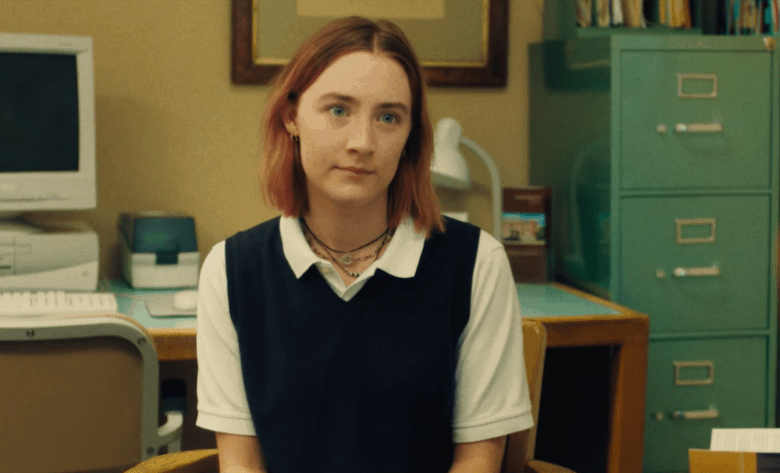
Director: Greta Gerwig
MPAA Rating: R
Runtime: 94 minutes
There was not a moment I experienced in the theatres this year that was remotely comparable to the sensation of knowing that 2017 gave us something as pure as Lady Bird. Unfolding like a sequence of perfectly timed beats, Lady Bird is capable of being and meaning so much more than it’s coming-of-age premise would fool you into thinking.
Expertly tuned into the often-chaotic frequency of the teenage experience, the stunning debut of mumblecore veteran Greta Gerwig is beautifully honest portrait of youthful idleness and that immediately recognizable feeling of being caught between worlds once we believe we have entered into adulthood. It is practically criminal how its R-rating would disbar those who could really benefit from seeing their psyche so emphatically rendered, but those who do will see the “teen film” in its most crystalline form.
Gerwig and her snappy, irreverent, emotionally wrecking script get youth at a level that sees the teenagers of the early 2000s at eye level. Her titular Lady Bird (a given name, given by her to her) is a character whose most engaging characteristic beyond the life-giving energy that actor Saoirse Ronan breathes into her is how believably flawed she is. Aspiring to leave her Sacramento home in pursuit of education on the East Coast, solely for the vague promise of “culture,” she remains blind to the class struggles of her family and to how her pursuit of youthful experience alienates them and her friends.
It is the flippancy that comes with Lady Bird’s age that Gerwig senses and puts to dialogue and action unlike any other director grappling with this beforehand. Due to this exquisite, nuanced writing on display, we are capable of feeling so much from the uproarious laughter when a well timed line hits to the sinking anxiety when things on screen get a little too recognizable. I am not ashamed to admit I wiped away tears for the former and the latter.

Mirroring the wastrel attitude of its titular waif, Gerwig’s direction breaks up this transitory point in Lady Bird’s life into these almost episodic sequences. Dragging her feet towards her high school graduation, the film develops over months and is experienced in a decoupage of minor, memorable moments that could have gone for as long as they wanted for all I care.
There’s a rhythm at play here that Gerwig and editor Nick Houy have created, and because of such care Lady Bird feels effortlessly paced, to the point where I wondered where all the time had gone while I watched it. Even setting the film against the first outbreaks of the Iraq war as an almost sobering reminder of the period, the film dramatizes underlines these feelings of changing times echoed in the structure and script. As far as complete packages go, Lady Bird is incredibly well rounded.
By far, the most impressive aspect of that package is the acting, and if wasn’t clear that Gerwig was going to be an “actor’s director” from her own varied career in front of the camera, what is done in Lady Bird makes it obvious. Besides the already mentioned Ronan, whose performance runs the gambit of adolescent moods like it was nothing, Laurie Metcalf deserves recognition for just embodying the stern parental figure of eternal sacrifice.

Wanting the best for her kids but incapable of putting idealism over reality, she and Ronan play well off one another in their mother-daughter dynamic, rife with passive aggressive bickering and shouting matches over what Lady Bird wants out of her future. Along with the warm levity of Tracy Letts as the father, the family politics form the heart of the film and provide some of the most devastating emotional moments, often through the simplest things like a muttered expletive at dinner or a silent treatment.
How Lady Bird deftly avoided the pitfalls of a genre I never cared about before to get me so firmly in its corner is quite beyond me. As a self-proclaimed detractor of the cinematic bildungsroman in the air of John Hughes, there was something more tangible and recognizable to Lady Bird’s formative years, which I have never gotten before. Multiple times I would see something in this film, either in how Lady Bird interacted with her parents or in the types of friends she earns and drifts apart from, that would spark a memory and hit me where it hurts emotionally.
I never got this sensation from previous portrayals of youth, and it is probably why I have come to champion Lady Bird’s coming of youth as a universal film experience. Obviously that it isn’t true, as we all go through our own experiences in our adolescence that are all valid, but I’d be surprised if you could come away from Lady Bird and not relate to something.

What exactly does Lady Bird “come of age” to, though? According to Ronan in a recent interview, it was important to her to demonstrate how being ambivalent and listless at that age is not the anxiety-creating-nightmare scenario we all once thought it was. Lady Bird works so damn well because it festers in this ambivalence, doesn’t cop out for easy answers and lets the new experiences and broken relationships of its eternally confused protagonist be our guide.
Because of this, Lady Bird not only becomes one of the best films of the year, but also one of the best films about teenagers ever made. Gerwig has directed a triumph of modern youth that will hopefully touch generations, both before and after mine, with its carefully direct and lovingly honest message.






